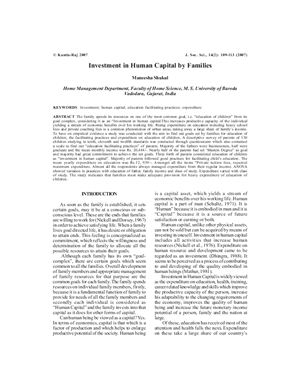ABSTRACT The family spends its resources on one of the most common
goal, i.e. education of children from its
goal complex, considering it as an Investment in human capital.This increases productive capacity of the individual
yielding a stream of economic benefits over his working life. Rising expenditure on education including heavy school
fees and private coaching fees is a common phenomenon of urban areas, taking away a large share of family’s income.
To have on empirical evidence a study was conducted with the aim to find out goals set by families for education of
children, the facilitating practices and expenditure on education of children. A descriptive survey of parents of 130
children studying in tenth, eleventh and twelfth standards was conducted through questionnaire which also contained
a scale to find out education facilitating practices of parents. Majority of the fathers were businessmen, half were
graduate and the mean monthly income was Rs. 20,444/-. Nearly half of the parents had set ‘Masters Degree as goal
and majority had great commitment to achieve the set goals. Three forth of parents considered education of children
as investment in human capital. Majority of parents followed good practices for facilitating child’s education. The
mean yearly expenditure on education was Rs.12, 939/-. Amongst all the items Private tuition fees, required
maximum expenditure. Almost all the respondents always managed expenditure from their regular income. ANOVA
showed variation in practices with education of father, family income and class of study. Expenditure varied with class
of study. The study indicates that families must make adequate provision for heavy expenditure of education of
children
goal complex, considering it as an Investment in human capital.This increases productive capacity of the individual
yielding a stream of economic benefits over his working life. Rising expenditure on education including heavy school
fees and private coaching fees is a common phenomenon of urban areas, taking away a large share of family’s income.
To have on empirical evidence a study was conducted with the aim to find out goals set by families for education of
children, the facilitating practices and expenditure on education of children. A descriptive survey of parents of 130
children studying in tenth, eleventh and twelfth standards was conducted through questionnaire which also contained
a scale to find out education facilitating practices of parents. Majority of the fathers were businessmen, half were
graduate and the mean monthly income was Rs. 20,444/-. Nearly half of the parents had set ‘Masters Degree as goal
and majority had great commitment to achieve the set goals. Three forth of parents considered education of children
as investment in human capital. Majority of parents followed good practices for facilitating child’s education. The
mean yearly expenditure on education was Rs.12, 939/-. Amongst all the items Private tuition fees, required
maximum expenditure. Almost all the respondents always managed expenditure from their regular income. ANOVA
showed variation in practices with education of father, family income and class of study. Expenditure varied with class
of study. The study indicates that families must make adequate provision for heavy expenditure of education of
children

